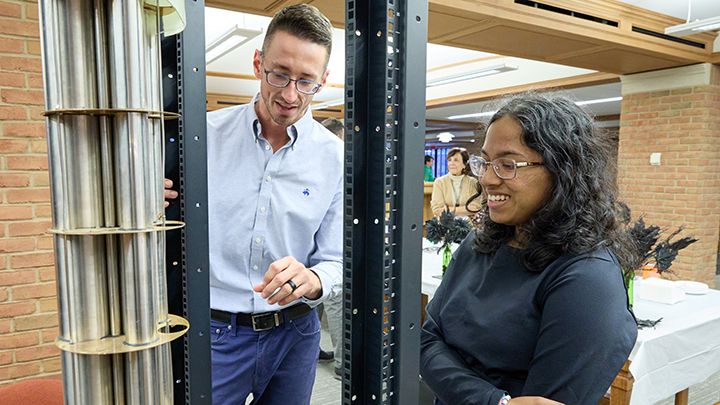
Florian Carle designed the Model Research Collection “From DOS to Qiskit: Turning Entanglement into Quantum Computation” for timid newcomers to the field of quantum physics and for those as passionate about the topic as he is.
“I wanted this model research collection to serve as a guide to someone completely new to the field of quantum physics,” Carle said, “interested in learning more, but not sure where to start”—not unlike he himself was at one time.
Now the manager of the Yale Quantum Institute, Carle has a background in theater and a PhD in rocket science. He found his way to quantum physics through books, he explained to the audience at the opening event. He is sharing that point of entry with others, through his careful selection of more than 35 books on the topic—from Quantum Physics for Babies and Quantum Steampunk to The Universal History of Computing: From the Abacus to the Quantum Computer.
Together, the wide-ranging volumes in the collection document the rapid advances made in the field of quantum theory since the early 20th century. They offer an overview of how those technological leaps have changed the ways humans interact with computers to process information—from the early classical computers that ran DOS software to today’s quantum computers that run Qiskit.
Carle organized the collection into five thematic sections “to allow students to pick their preferred approach to learning,” he said. “If you want to learn about quantum through the scientists who created the field, you can look at ‘The History of Quantum Computers,’” Carle said. “But if you prefer a more applied approach you can look at ‘Applications of Quantum Computers’ or ‘Quantum Computer in Pop Culture.’ You can also dive straight into the deep end with the section ‘Quantum Theory.’” There’s something for everyone.
Also on view, in the library and in the display case in Bass-Sterling hallway, are pre-quantum computers, “floppy” disks and other storage systems, and quantum bits from Yale’s laboratories.
“It was important to me to include artifacts of the quantum technology alongside the books,” Carle said.
“One of the main difficulties people are confronted with when learning about quantum science is the lack of references. You can learn about qubits, spins, entanglement, dilution fridges—but those remain abstractions if you have never seen a quantum device. Once you’ve seen one, all your reading will be enhanced by that visual image. You might then be able to make a mental image of the path of the electrons in these complex devices.”
The Model Research Collection “From DOS to Qiskit: Turning Entanglement into Quantum Computation” will be on display in Bass Library through May 6.
The Yale Quantum Institute offers a series of events during the year. In April, to celebrate World Quantum Day 2024, it will host a pop-up exhibit titled “Rare Books on Quantum and Science.”
The institute also sponsors the Yale Undergrad Quantum Computing (YuQC) group, which promotes and facilitates undergraduate participation in quantum information science.
Each year, the Model Research Collection series highlights a researcher’s process of investigation into a topic of choice, expressed physically through a curated collection of library resources. The series is designed to bring to light the breadth and depth of Yale Library’s resources.
Read about past events in the Model Research Collection series.